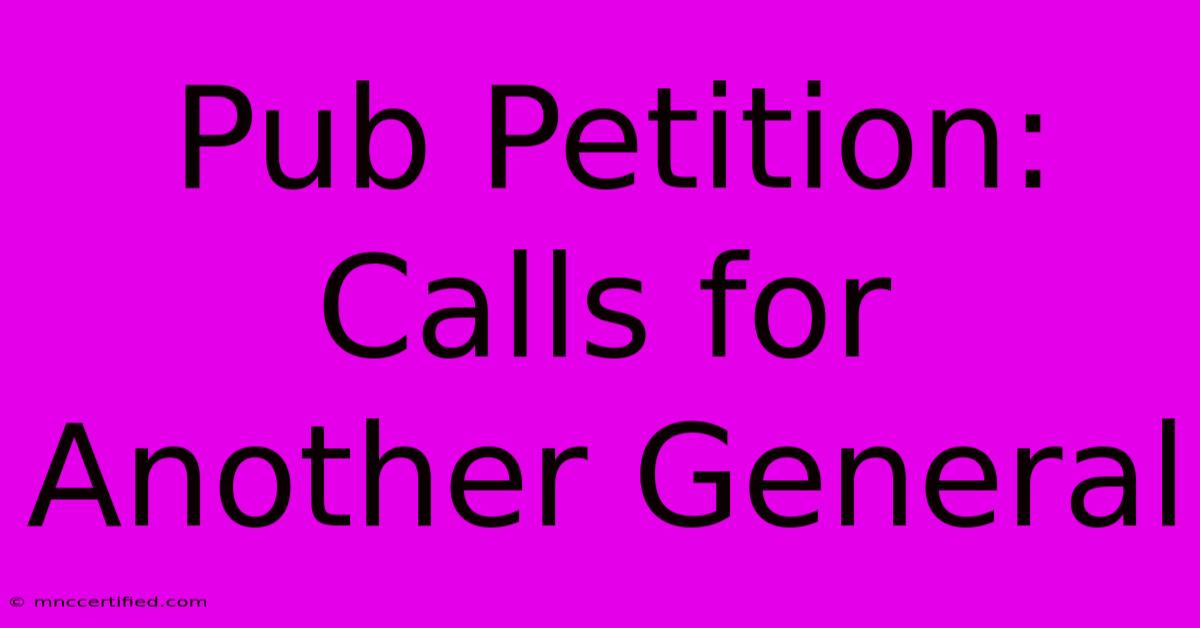Pub Petition: Calls For Another General

Table of Contents
Pub Petition: Calls for Another General Election
The UK political landscape is buzzing with talk of a potential snap general election, fueled by a surprising grassroots movement: a pub petition. This isn't your typical online petition; this one's gathering signatures in the heart of British social life – the local pub. But is this quirky campaign a genuine threat to the current government, or just a fleeting moment of pub-fueled political discontent? Let's delve into the details.
The Genesis of the Pub Petition
The exact origins of the petition remain somewhat shrouded in mystery, with different pubs across the country independently launching their own versions. However, the common thread is a growing dissatisfaction with the current government's handling of various key issues. These issues, often discussed animatedly over pints of bitter, range from the cost of living crisis to the NHS waiting lists and the ongoing fallout from Brexit.
The petitions themselves vary in format, but generally involve a simple signature sheet placed prominently behind the bar, inviting patrons to add their names and perhaps a brief comment. This grassroots approach taps into a sense of community and fosters a feeling of direct engagement, unlike the often impersonal nature of online petitions.
Why Pubs? The Power of Local Connection
The choice of pubs as the collection point is a stroke of genius. Pubs are more than just places to drink; they are community hubs, meeting places, and often the center of local gossip and political debate. By placing the petition in these familiar, convivial settings, the organizers have leveraged the power of social interaction to maximize their reach and engagement. This contrasts sharply with online petitions which can often feel isolating and lack the tangible sense of participation that a physical signature provides.
The Momentum and Challenges
While the exact number of signatures remains difficult to quantify (due to the decentralized nature of the campaign), anecdotal evidence suggests a significant level of public support. Social media has played a key role in amplifying the message, with photos and videos of pub petitions circulating widely, generating further interest and prompting others to initiate their own collections.
However, translating this grassroots support into meaningful political pressure remains a challenge. The decentralized nature of the campaign makes it difficult to consolidate the data and present a unified front to the government. Moreover, the informal nature of the petition means its legitimacy might be questioned by more formal political processes.
Can a Pub Petition Trigger a General Election?
While highly unlikely, the pub petition highlights a significant level of public dissatisfaction. It serves as a barometer of public sentiment, demonstrating the widespread discontent that could potentially influence future electoral outcomes. While it’s unlikely to directly force a general election, it acts as a powerful symbol of the public mood and could contribute to the broader pressure on the government.
The Wider Implications
Beyond the immediate question of a general election, the pub petition demonstrates the enduring power of community engagement and the role of informal social spaces in political mobilization. It underscores the importance of local activism and the potential for bottom-up initiatives to generate significant political attention.
The success of the pub petition, however measured, highlights the need for politicians to pay attention to grassroots sentiment and engage with the public in meaningful ways. It serves as a reminder that political engagement isn't solely confined to formal structures and online platforms, but can also flourish in the most unexpected of places – the heart of the local pub.
Keywords: Pub Petition, General Election, UK Politics, Grassroots Movement, Cost of Living Crisis, NHS Waiting Lists, Brexit, Political Engagement, Community Activism, Social Media, Public Opinion.

Thank you for visiting our website wich cover about Pub Petition: Calls For Another General. We hope the information provided has been useful to you. Feel free to contact us if you have any questions or need further assistance. See you next time and dont miss to bookmark.
Featured Posts
-
Uk Denies Diplomat Was A Spy
Nov 27, 2024
-
Reverend Coles On Loss
Nov 27, 2024
-
Havant Mp At Ucl
Nov 27, 2024
-
Canada Mexico Defy Trumps Tariff Threats
Nov 27, 2024
-
Paul Bissonnette Attacked In Arizona
Nov 27, 2024